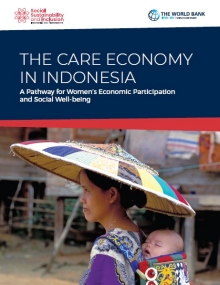The World Bank Gender Equality for Growth Program is an analytical and advisory program that aims to support the Government of Indonesia through recommendations for reforms and investments that close gender gaps and promote economic growth. The program generates evidence and identifies cross-cutting solutions to address gaps between men’s and women’s economic participation. It is anchored in the World Bank Group’s Country Partnership Framework (CPF) 2021-2025 that highlights Gender as a cross-cutting theme in four engagement areas, as well as in Indonesia’s Medium-Term Development Plan (RPJMN) 2020-2024.
Labor Force Participation
Indonesia’s female labor force participation rate is comparatively low, around 53 percent in 2021, and has remained unchanged for over two decades despite structural changes to the economy, gains in education, declining early marriage rates, and lower fertility. In addition, the gap between men and women in labor force participation rate is one of the largest in the region at around 30 percent.
The Indonesia Country Gender Assessment (CGA) conducted in 2020 found that while Indonesia is actively looking to improve competitiveness and create jobs through different labor market policies and programs, many of these efforts present inherent bias, contributing to occupational sex segregation and channeling women into lower productivity and lower-paying jobs. Women own about 60 percent of Indonesia’s micro, small and medium enterprises (MSMEs), but they are overrepresented among micro enterprises, and their growth aspirations are hindered by lower access to credit and markets than male-owned businesses.
Care Economy
As Indonesia moves toward middle-class jobs and growth of manufacturing and services sectors, the work-care nexus is becoming a constraint to women’s ability to seek paid work. The scarcity of affordable and quality childcare services prompts many women to stop working outside the home. To meet the unmet need for family care, many women drop out of the labor market after marriage and childbirth, and only return as small-scale entrepreneurs or self-employed workers.
According to a recent World Bank study, if Indonesia increased public expenditure on childcare services to 0.5 percent of its GDP from its current share of 0.04 percent, the female labor force participation rate would increase to 58 percent and the economy would grow by an additional $62 billion or 0.7 percentage points. Supporting investments in the care economy can deliver long-term human capital gains for future, as well as leading to improvements in employment and the earnings of women, improvements in firm productivity, and job creation.
Gender Engagement Strategy
The World Bank is implementing the Gender Engagement Strategy to raise awareness about gender gaps in Indonesia and to inspire action toward addressing gender gaps in labor markets and beyond. The strategy uses a variety of engagement tools and platforms to generate discussion with members of government, civil society, academia, and the private sector.
The series of high-level events and advocacy campaigns include Women in Leadership Panel Series, Women in the Workplace Series, and Investing in Childcare. With an intended aim of bringing together influential women figures across the public and private spheres, the series elevates women’s leadership journeys by fostering authentic conversations on the various pathways to success for women in the labor force.




















